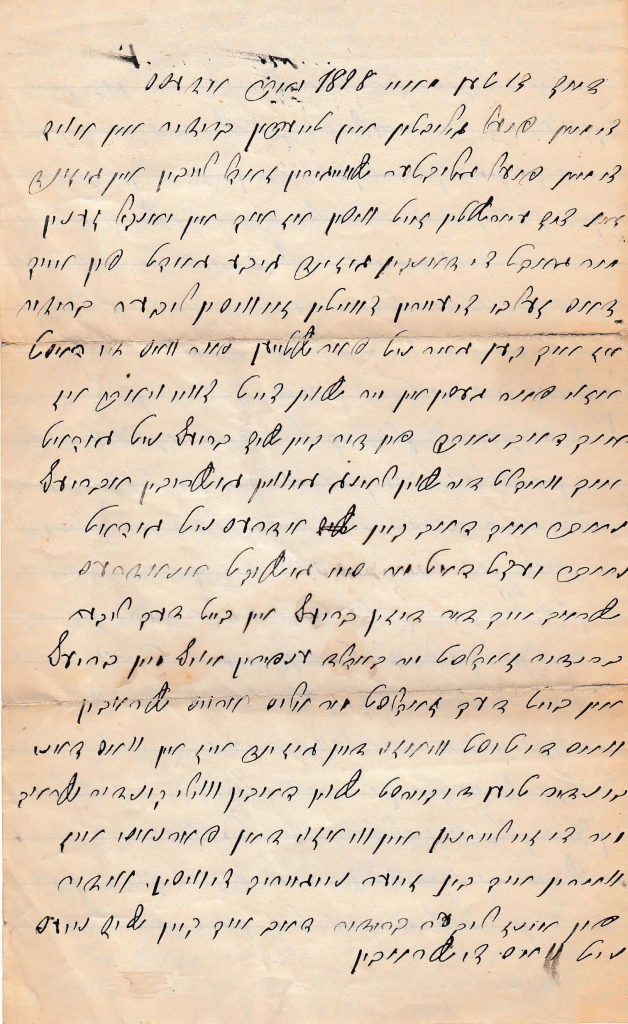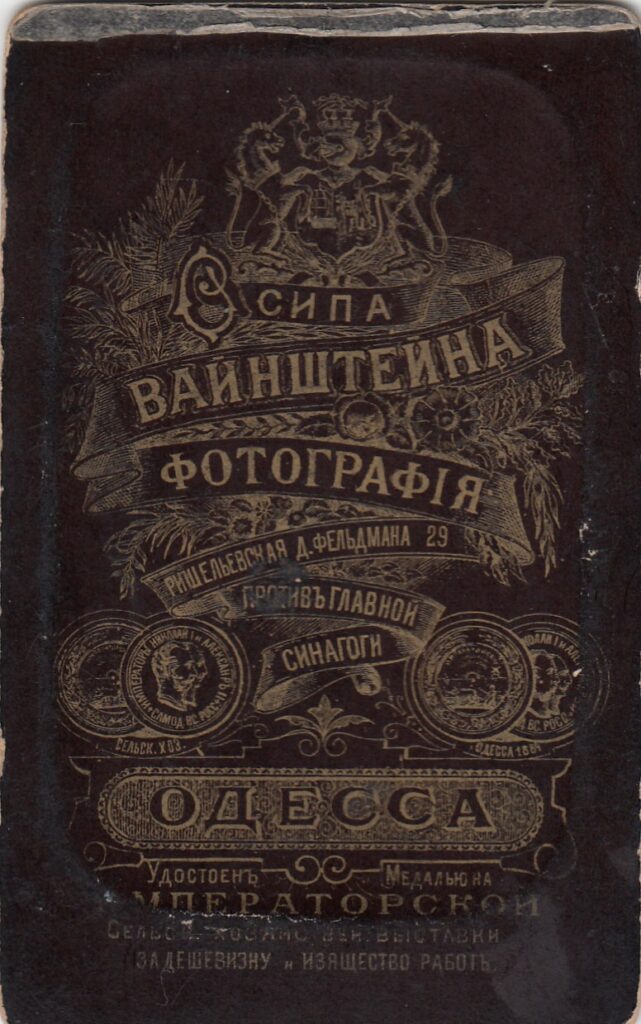
april 3, 1898
The Trial of Jews for Attacking the Army.
[FROM OUR OWN CORRESPONDENT.]
St. Petersburg, 3rd April.
The Trial of Jews for Attacking the Army.
The trial of the fourteen Jews who were charged with “an attack on the Russian Army” commenced at Minsk on the 30th March, and at the time of writing had not yet been concluded. [Since this letter was despatched the result came to hand through Reuter, and was made known in our last issue. Nine of the defendants were acquitted and five sentenced to two years’ imprisonment each.] The indictment is a very interesting document, and contains the following charges. On the 15th (27th) April, 1897, the third day of the Russian Easter, a number of soldiers belonging to the 119th and 120th Regiments, which were garrisoned at Minsk, were walking in the streets. Three of their number picked a quarrel on the Market place with some Jewish tradesmen, on a military question. The Jews said: “We ourselves have been in the service, and know all about it,” to which the soldiers replied: “You only served a short time, we serve much longer and know everything better than you.” A Jew must then have ridiculed the soldier, whereupon three of his comrades retorted by abusing and maltreating the Jews. As at the same time a number of drunken people were about who were quarrelling with the Jews, the latter imagined that a riot was about to ensue. They at once closed all their stalls, and an intimation was sent to the police that the Jews were being beaten. M. Sakalinsky, the Chief of Police, telephoned to the Commandant a request for military assistance, and soldiers were sent to arrest the disturbers. It is alleged that the Jews then fell on the soldiers with sticks and cudgels, and that as a result a gun was broken. The indictment goes on to say that the Jews made this attack “from hatred of the military and the Christian population.” It is true, however, and is apparent from some facts mentioned in the indictment, that the soldiers were drunk, that it was they who commenced to beat the Jews, and that some of the latter defended themselves from the attack. The anti-Semitic press are making considerable capital out of this cause célèbre. The Jews are being reviled. The Jewish population is thoroughly dejected, and is anxiously awaiting the result of the trial.
WEDNESDAY DECEMBER 28, 1898
JEWS IN RUSSIA.
A decision just rendered by the Imperial Senate of St. Petersburg in reference to a petition of a Russian Jew is well worth noting (says the “Morning Post”), for it illustrates in a rather amusing fashion the extent to which the Hebrews under the dominion of the Muscovites come under the ban of legislative control. Incredible though such thing may appear, it is, nevertheless, a fact that a Jew in Russia has not the right to name his own child as he pleases, but must give his offspring such appellation as the police regulations made and provided ordain. He is restricted to Biblical names, and, moreover, he must not give his child modernised form of the Biblical names which he allowed to choose from. Thus, he may bestow his son such names as Abraham, Jacob, or Samuel— to give one or two examples — but they must be in the Hebraic or Yiddish form of Avrohom, Yankev or Shemuel. The use of the modernised name is prohibited, and subjects the Jew using it to a penalty.
A South Russian Jew recently ventured to defy the ordinance so far as to call his son Samuel instead Shemuel. The police declined to permit this, and the reforming Hebrew thereon appealed to the Imperial Senate. This august body has now decided that Shemuel is only a variant of Samuel, and that, therefore, the regulations applicable the naming of Jewish children have not been violated. The decision, of course, does not signify that a Russian Jew may choose any appellation likes for his offspring, but simply applies to the peculiar case of Samuel. The Hebrew who attempts to style a son of his Abraham instead of Avrohom will still have to reckon with the police, and bring his case before the Senate of the Empire if he determined to challenge the action of the local authorities. That such penalties should engage the attention of the highest legislative and consultative body in the Russian Empire is a striking indication of the intellectual level which even the educated Muscovite appears to have attained the close of the Nineteenth Century.
March 10th 1898 Jacques was born to Abraham and Dora.
Correspondence
31st May 1898, Odessa
To Abraham and Dora from Perel. Written in Yiddish.

To my much-loved brother and also to my much-loved sister-in-law, may you live and be well.
First of all, please be informed that I and Yankel are well, thank God, and may God grant that we hear the same about you.
Secondly, please be informed, dear brother, that I can absolutely not understand why you have forgotten me so completely. I have not had a single letter from you for two years now. I would have written a letter to you a long time ago, but I did not have an address for you. However, Sima has now sent me an address, so I am writing you this letter. I beg you, dear brother, please reply quickly to my letter and tell me everything about what you are doing, your state of health, and what the children are doing. You must have nice children. Write whether they are studying and what you do for a living. I am very interested to know.
As far as we are concerned, dear brother, there is no news to write to you.
I can only tell you that Yankel has to report for military service 1 and he wants to leave the country and go to London. I have asked Sima to send him only a ship ticket for the journey from Vienna, in the same way that Sima was sent a ticket. Yankel has thirty roubles for the journey as far as Vienna. He made thirty roubles in New Year money and he put it aside for the journey. Sima wrote to me that a ship ticket would cost 30 roubles, and the office is now in London and not Vienna.
… not long after they had spent money on a wedding, and that is why they cannot help me so much. All they can let me have is fifteen roubles. Sima’s husband wants to help. He has written that Yankel can stay with them and they will give him board and lodging. He will also teach Yankel a trade, so that he will be able to earn some money. Sima’s husband has written to me that he would have done everything he could to bring Yankel over to them but is not in a position to do so. So much so, that he went over to Sheindel’s with Sima.
They showed Sheindel and her husband the letter I had written them, and he asked David to contribute fifteen roubles and he would contribute the other half, so that they could send Yankel a ship ticket. David replied that he would not give even a farthing, he had already given enough. Sima started shouting, too, and the two couples quarrelled and no longer visit each other.
Now, dear brother, you can imagine how bad they are not to care that Yankel will be conscripted because they would not give the small amount of help they were asked for. Since Sima got married, they have become so bad, that they have not even sent me as much as a piece of bread. Only God really knows how bad things are with me. However, I have never asked them for anything, and now, when I so urgently need to save my child from gentile hands and ask them for such a small amount of help, I can still not succeed. Sima’s husband is a very fine person with a good character, but he is not yet in a position to help very much.
I ask you, dear brother, to send me the correct address for the place Sheindel has moved too. I have sent them a letter, but I do not know whether it will reach them, because the address is not right.
So, dear brother, I ask you if it is possible for you to help me with ten roubles. If so, I will write to Sima that they should send me the fifteen roubles they want to give me. When they do, Yankel will be able to travel without Sheindel’s help. You can believe me, dear brother that, if you help me, with whatever amount, you will keep Yankel alive. If you do not, time will run out and he will not be able to return afterwards. Dear and precious brother, I beg you to have pity on me and do everything possible to help us with ten roubles, so that he should be able to save himself. I beg you for a speedy reply.
I and Yankel send you, dear brother, and your dear wife very loving and cordial greetings, and we send loving greetings to your dear children. We wish you health and happiness from the depths of our hearts. We ask you, dear brother for a speedy reply. I want to know what to write to the children.
From me, your sister and nephew who are looking forward to your reply.
Perel and Yankel
City of Odessa, Russia. Rishelevskaya Street, No. 57, Flat 21


